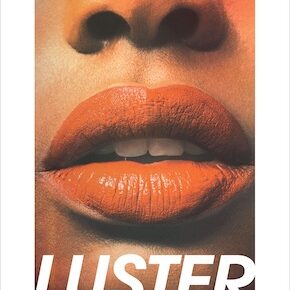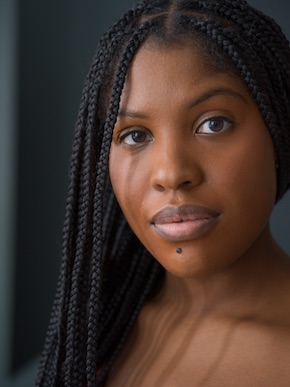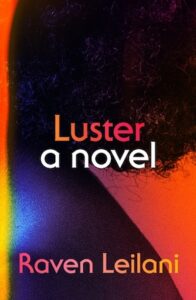Raven Leilani: In the air tonight
by Farhana Gani
“This is a book of pure fineness, exceptional.” Diana Evans, Guardian
Luster is an original, darkly funny debut about an interracial love triangle, by a new voice with the power to turn modern manners upside down and inside out.
Edie is having online sex with Eric, a man she met on a dating app who messages her with impeccable punctuation – she has a good feeling about him “based on his liberal use of the semi-colon”.
In her early 20s, Edie is working in a low-level editorial job at a New York publishing house. The only other black person in her department is Aria “which forces a comparison between us that never favors me.” Edie has great breasts, her salary is very low, she has trouble making friends and men lose interest when she talks. Those are the words Edie uses to describe herself. She has had sex with many of her colleagues (“the best part of the job”), from the IT guy to the contracts guy, the sales guy, the mailroom guy, to the head of the art department. Edie is also an artist, a painter who suffers from that common affliction amongst creatives: a debilitating lack of self-belief.
Eric is a 40-something affluent white man in an open marriage. His wife Rebecca knows all about Edie, and she insists on a set of written rules for them to conduct their affair by. Akila is Eric and Rebecca’s young adopted daughter. Akila is black.
So far, so unconventional. The edginess goes up a notch when Edie loses her publishing job, finds herself homeless and, unknown to Eric who is out of town at a work conference, is invited to stay with Rebecca and Akila in their lavish suburban home. And then he returns.
Edie likes to be hit, punched, hurt. Eric is happy to oblige. The dynamic between Rebecca and Edie is even more complex. Two women, sharing a man, caring about a child.”
Without giving too much away, the pleasure in reading this book comes from seeing how cleverly Leilani develops an extra-marital storyline about an independent young woman and a mid-life married man, into a psychologically twisted black comedy of modern Manhattan manners.
The power imbalance between Edie and Eric is an unstable aphrodisiac. His power comes from age but no great status, while Edie has the power of youth but is turned on by being used, which is a recipe for disaster. Edie likes to be hit, punched, hurt. Eric is happy to oblige. The dynamic between Rebecca and Edie is even more complex. Two women, sharing a man, caring about a child.
Matters of race drench this novel. Black-versus-white racial tension goes largely unvoiced but adds a brittle edge to proceedings. Edie is very funny in her initial observation of Eric navigating the new territory of dating a black woman: “I can feel it in how cautiously he says African American. How he absolutely refuses to say the word black.” Edie states she “cannot be the first black girl a white man dates.” And yet she changes her mind for him.
There’s a less careful, more straight-up-honest dynamic between Edie and Aria. Edie describes her colleague as smart and lovely but she resents her because Aria “plays the game well”, “doing that unthreatening aw-shucks schtick for all the professional whites… it is an art – to be black and dogged and inoffensive.” Edie sees how Aria is manipulating the situation to her advantage, feels threatened by her, but still wants to be her friend. Things come to a head when Edie is fired and replaced by Aria, who tells her: “You think because you slack and express no impulse control that you’re like, black power. Sticking it to the white man… But you’re just exactly what they expect… there is actually a brief window where they don’t know to what extent you’re black, and you have to get in there.”
Edie and Eric; Edie and Rebecca; Edie and Akila; Edie and Aria – various relationships play out in this remarkable debut novel. But at its heart is Edie’s relationship with herself. I caught up with Raven to talk about the book, why Edie is the way she is, and publishing in a lockdown.
Farhana: Your debut novel is causing a stir on both sides of the pond. How long did you work on it, and what was your writing regime?
Raven: I worked on the novel for a year, after throwing away a previous manuscript that I hoped would be my first novel. I think it came faster than it would’ve otherwise, because I was in such a panic. I was working full-time and in school full-time, so I wrote mostly at night and on weekends, always at home.
Your former tutor at NYU, Zadie Smith, is among a chorus of writers who have praised your debut. What was it about the MFA that most helped shape this novel and your confidence as a writer? And how has it felt to have the book so well received?
It was really useful to me to have a cohort who could report back to me what was and wasn’t working about my manuscript, or just how they were receiving it. There are times when I think it’s important to keep the work private, but when I felt able to share, that environment forced me to articulate more straightforwardly the ideas I had that I was previously too afraid to commit to the page.
It was important for me to write a story about a black woman where she is allowed to stumble and make mistakes, to make the wrong and sometimes unethical choice. We find ourselves through trial and error.”
Edie is obviously bright and capable, yet she chooses to remain in a low-salary, low-satisfaction job, with colleagues she has no rapport with. What is holding her back, or what is she waiting for?
The point is more that no matter how bright and capable you are, you still have to contend with these structural impediments that are largely beyond your control. A lot of people have talent, and a lot of people have grit, but if your bandwidth is exhausted just trying to live, if you have to contend with an environment that is openly and covertly hostile to your existence and aspiration, you can get lost, and a lot of bright and capable people do.
In contrast to Edie, Eric’s wife Rebecca is a formidable character. In spite of their mutual resentment the two women form a spiky but tender bond. What are the key factors that make this so believable?
Their relationship is subject to a steep power imbalance. Edie is trying to survive and she pursues these primary needs on the terms of a woman who cannot fathom this kind of precarity. But Rebecca too is getting something from Edie’s presence in their house. A supposedly reinvigorated marriage, a maternal surrogate for her adopted daughter. So as they draw closer, the conspiracy between them is frustrated by the emotional consequences of that transaction, by the friction of their lived experience.
Aside from sex, Edie and Eric’s shared passion is for 1970s disco music, which is first channelled via Idris Muhammad’s ‘Could Heaven Ever Be Like This’ playing on the car radio. Any true film adaptation would need to secure that song, some Donna Summer, KC and the Sunshine Band, Hall and Oates, ABBA, and Phil Collins’ ‘In the Air Tonight’ for the soundtrack. Is your own music taste as retro as these characters’?
It is! A remnant from these long road trips I used to take with my mother. She exposed me to a lot of those records and so I have a soft spot for them, because of the context – the open road, sharing this thing with my mother, but also the genre is such a good time. It’s black and queer and full of joy. But I love a lot of music. Writing this book, I listened to whatever moved me, never anything slow, always something animated, percussive.
There are moments in the novel I found myself urging Edie to stop, not pursue the direction she was heading. That’s a powerful emotion for a writer to invoke in a reader. Was that your intention as you shaped Edie’s trajectory?
I felt that even as the writer! But it was important for me to write a story about a black woman where she is allowed to stumble and make mistakes, to make the wrong and sometimes unethical choice. We find ourselves through trial and error, and I thought ultimately that was the more true, humane depiction.
The pandemic has disrupted the usual book promotion tours and bookshop events. Are video events working for you? And do you a see a future in switching to online events? At least more people from different parts of the country, even the world, can tune into an interview, right?
It’s my first time around, so this is the only way I’ve ever experienced it. There is a different kind of intimacy digitally – it feels like you are listening in on a private conversation, and the events are more accessible, but I do look forward to physically being in a room with actual people, feeling the energy of a room.
Tell us about your own reading habits. Which recent books would you particularly recommend?
I find it very hard to slog through something that I’m not enjoying. I’m not inclined to finish a book just so I can say I’ve finished a book, so it’s sporadic – I’ll cycle through until I find a place I’d like to stay. So I’m often reading a handful of books at once. Books I’d recommend are: Want by Lynn Steger Strong, Milk Blood Heat by Dantiel Moniz, This Close to Okay by Leesa Cross-Smith, Love in Colour by Bolu Babalola and Libertie by Kaitlyn Greenidge.
 Raven Leilani’s work has been published in Granta, McSweeney’s Quarterly Concern and The Cut, among other publications. She received her MFA from NYU and is currently the Axinn Foundation Writer in Residence there. Luster, her first novel, is published by Picador in hardback, eBook and audio download.
Raven Leilani’s work has been published in Granta, McSweeney’s Quarterly Concern and The Cut, among other publications. She received her MFA from NYU and is currently the Axinn Foundation Writer in Residence there. Luster, her first novel, is published by Picador in hardback, eBook and audio download.
Read more
ravenleilani.weebly.com
raven_leilani
@RavenLeilani
Author portrait © Nina Subin
Farhana Gani is a freelance writer and a founding editor of Bookanista.
@farhanagani11
@bookanista
wearebookanista
bookanista.com/author/farhana/


